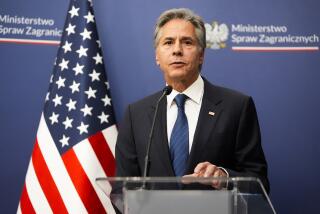Bad Old Days for Russian Media
Russia’s biggest accomplishment in the past decade is the establishment of a free press. Even as the economy collapsed and corruption ruled, newspapers advanced. Stodgy publishers of official speeches shifted to lively and often scathing commentary and criticism of the government.
Former President Boris N. Yeltsin used the media, especially television, to win his 1996 reelection, and he never tried to muzzle them. That situation is worrisomely changing under his successor, Vladimir V. Putin. The new president, a former KGB operative, is raising alarms with his campaign of intimidation against critics and crude attempts to control the flow of information.
Putin first went after Vladimir A. Gusinsky, the owner of Media-Most, a conglomerate that runs the independent NTV television network, a radio station and several newspapers known for their harsh criticism of Putin’s war in Chechnya. Police raided Gusinsky’s office in May and jailed him for several days on embezzlement charges, later dropped. He is being forced to sell his Media-Most holdings, and on Thursday prosecutors launched a new investigation. They say they now are trying to determine whether Media-Most illegally transferred assets abroad in a bid to conceal them from Gazprom, Russia’s natural gas monopoly, which is trying to take over the conglomerate.
Putin is also pressuring Boris A. Berezov- sky, another media mogul, into selling his minority stake in ORT, a TV network controlled by the government.
Just as disturbing is Putin’s new national “information security” doctrine, ostensibly aimed at helping in the development of information technology. Such “official” information would include the pack of lies disseminated by the government when the nuclear submarine Kursk sank in mid-August.
More to Read
Sign up for Essential California
The most important California stories and recommendations in your inbox every morning.
You may occasionally receive promotional content from the Los Angeles Times.










